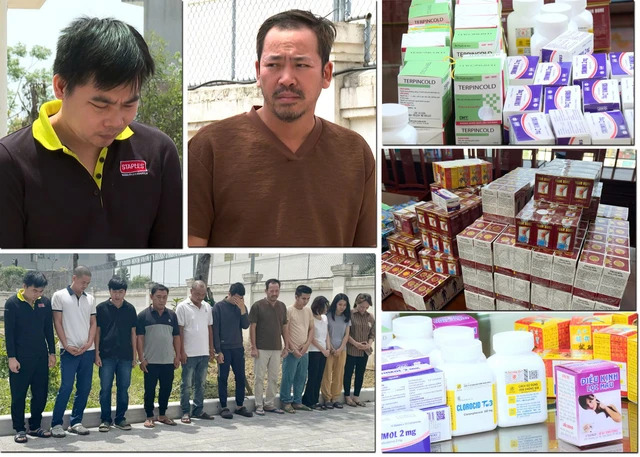 Society
Society


|
| The ring manufactured and sold counterfeit musculoskeletal medicines to old people. — Photo nld.com.vn |
THANH HÓA — Police from the central province of Thanh Hóa have busted a large-scale counterfeit pharmaceutical manufacturing and trading ring, which sold low-cost musculoskeletal medicines to old people.
Conducting urgent searches at six locations used for manufacturing and storing counterfeit medicines in Hà Nội, HCM City, Vĩnh Phúc, Hưng Yên, An Giang, and Đồng Tháp provinces, the police seized 21 types of counterfeit pharmaceutical products treating musculoskeletal diseases.
Officers also confiscated over 18,000 empty boxes, 142kg of various pills, tablets and powders, along with machinery and equipment used in the production process.
The total weight of seized counterfeit medicines and raw materials amounted to nearly ten tonnes.
Fourteen individuals involved have been arrested.
According to the police, ring leader Nguyễn Tiến Đạt, born in 1991 and living in Hà Nội, collaborated with Trịnh Doãn Giáo, born in 1985, living in HCM City, investing in machinery and production lines and researched the composition of pharmaceutical drugs.
They then purchased raw materials of unclear origin, including pharmaceuticals, herbs and medicinal plants, and hired workers to grind and mix them into powder.
They used the machines to form capsules, blister-packs and packages for the counterfeit drugs, distributing them through various channels.
Between 2021 and their arrest, the group sold a large quantity of counterfeit drugs, making illicit profits estimated at nearly VNĐ200 billion or about US$8 million.
Initial investigations revealed the ring had been active for four years, exploiting the common practice of Vietnamese people who self-medicate, without official prescriptions and their lack of awareness about how to find out where medicine originates.
They targeted elderly consumers, who often seek affordable medications for joint pain, degenerative conditions and numbness, and are more likely to buy medicines without too much scrutiny.
Rather than counterfeiting well-known brands, the ring created their own product names and fake companies, often pretending those companies were based overseas, making it easier to deceive consumers into believing the products were legitimate.
The investigation continues. — VNS




